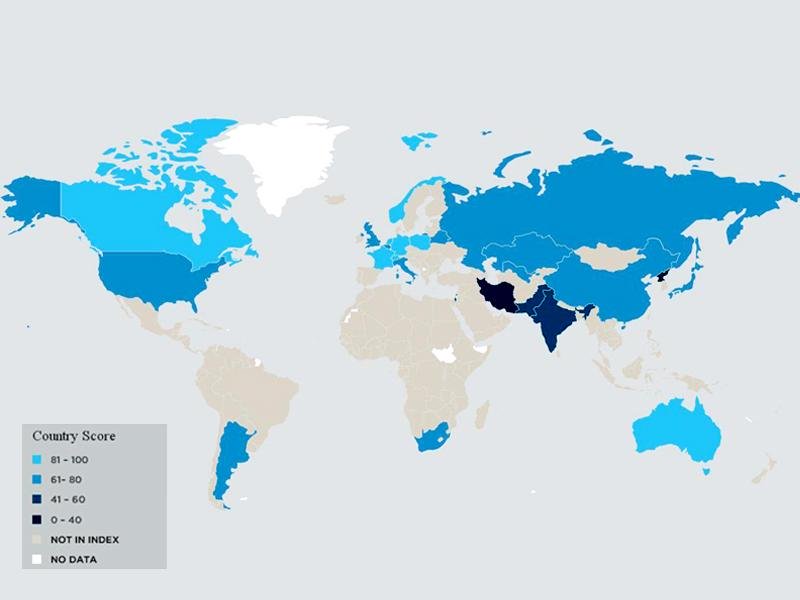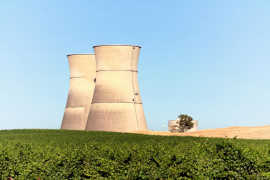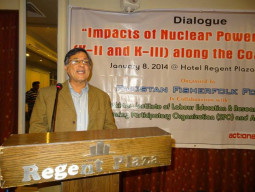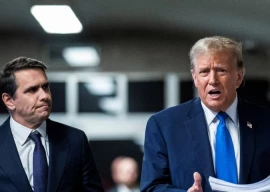
A US study released on January 9, 2014, on worldwide nuclear material security described Pakistan as the 'most improved' country among nine nuclear-armed states, and a state better at safeguarding its nuclear materials than arch-rivals India after having boosted physical protection of nuclear material and weapons.
Among 25 countries with weapons-grade nuclear materials, Pakistan was ranked 22 (46 points out of 100) where as India ranked 23 (41 points out of 100).
"Pakistan, which improved its score by three points compared with 2012," the NTI report says, "demonstrated the largest improvement of any nuclear-armed state. Pakistan is taking steps to update its nuclear security regulations and to implement nuclear security best practices."
The country's score benefited primarily from increased physical protection and stringent regulation of licences and on-site security reviews.
India registered an improvement of one point since 2012.
Army chief satisfied with nuke defence
On Friday, Chief of Army Staff General Raheel Sharif visited the Strategic Planning Division and was briefed on the strategic programme of the country.
According to an Inter-services Public Relations release, Gen Sharif said that Pakistan's nuclear programme was of central importance to the country's defence programme.
He expressed satisfaction over the robust nuclear command and control structure and security controls guarding the nation's strategic assets.
Nuclear Materials Security Index — Methodology
The Nuclear Threat Initiative (NTI) — founded by US Senator Sam Nunn and CNN founder Ted Turnder — describes itself as "a non-profit, non-partisan organisation with a mission to strengthen global security by reducing the risk of use and preventing the spread of nuclear, biological, and chemical weapons."
"The 2014 Nuclear Threat Initiative Nuclear Materials Security Index is the second edition of a unique public assessment of nuclear materials security conditions around the world."
"It assesses states in five categories: (a) Quantities and Sites, (b) Security and Control Measures, (c) Global Norms, (d) Domestic Commitments and Capacity, and (e) Risk Environment."
Global rankings
The report highlighted positive developments in a host in terms of (a) decreasing quantities of materials; (b) strengthening physical protection measures; and (c) passing new domestic laws and regulations aimed at better securing materials at facilities and during transport.
The overall rankings for security of weapons-usable materials put Australia at the top (same as in 2012); United States and United Kingdom tied on the 11th; Russia on 18th, and China, Israel, Pakistan and India stacked together near the bottom, where sat North Korea (same as in 2012).
Pakistan

Source: Ntiindex.org
NTI's Pakistan profile said "Pakistan’s score increased by three points compared to 2012."
"Pakistan’s improvement is primarily due to an increased score for on-site physical protection resulting from new laws and regulations requiring licensees to provide physical protection to nuclear sites and on-site reviews of security."
It added, however, that:
"Pakistan’s nuclear materials security conditions also remain adversely affected due to political instability, high levels of corruption among public officials, and the presence and capability on its territory of criminal or terrorist groups interested in illicitly acquiring nuclear materials."
Making recommendations for further strengthening nuclear security, the NTI said:
"In the future, Pakistan’s nuclear materials security conditions could be further improved by strengthening its laws and regulations for physical security of material during transport to reflect the latest IAEA nuclear security guidelines, and for mitigating the insider threat, particularly by requiring personnel to report suspicious behavior and requiring constant surveillance of areas of facilities where nuclear material is located."
Versus India
Breaking down the scores, the report has India scoring higher than Pakistan on international legal commitments because of having adopted treaties which Pakistan has yet to ratify.
Pakistan, however, scored higher in the following areas: existence of an independent regulatory agency; an invitation of peer review of its nuclear security arrangements; and having security and other personnel with access to nuclear materials subjected to additional vetting.
In addition, the report favours Pakistan for having an operational Center of Excellence (COE), whereas the foundation of India’s Global Center for Nuclear Energy Partnership was only recently laid on January 3, 2014.

Source: Ntiindex.org
COMMENTS (31)
Comments are moderated and generally will be posted if they are on-topic and not abusive.
For more information, please see our Comments FAQ






































1713525343-0/WhatsApp-Image-2024-04-19-at-4-09-16-PM-(1)1713525343-0-270x192.webp)
1713525453-0/Henry-Cavill-in-James-Bond-(AI)1713525453-0-270x192.webp)























Do Not ever judge the book by its cover...everything is okeay for those who wants to be okeay.. Every nation wants their country to be peacefull for thaat reason nuclear power is the only thing to stanf among those who orders.
@Indian: I belive you need to think unbiased. You are saying everthing in pakistan animosity!!!!
the country with 7000odd nuclear warheads asks others for restrain on the issue. asks countries like India to sign the NPT. the moment they come to the nos. India has 100, Dr. kalam said India will sign the NPT and CTBT.
@Khan: is it not the same in your country. Take a close look at yourself before pointing fingers at others. As they say ‘Empty vessels make the loudest sounds’
Why do you assume that I am from India ? For your info I am UK national, born and brought up, educated in states and paying my Taxes in UK ! This India Phobia is going to be your Nation's downfall and it is just that, which has allowed your Elite to rule over you since the creation of this Nation and not that they have achieved very much in over six decades, except managed to loose half of its territory too !
It is due to Islamic bomb and Kashmir issue the predater is chasing the prey . Now you are living in a sovereignityless nation . BUT A lot has to be done to survive as a nation .
It is due to Islamic bomb and Kashmir issue the predater is chasing the prey . Now you are living in a sovereignityless nation . A lot has to be done to survive
@Dr.A.K.Tewari: Bravo Sir Dr. Sahab!
Because it is due to non availability of the required spare parts most of them are not working .
Yankee certificate not required. thankyou
the very fact that the trigger of Pakistani nukes is in the hands of Pakistan army is enough to conclude that Pakistan is not a responsible state. Pakistan army is a rogue army which operates on its own. on the other hand India's impeccable record of nuclear proliferation and NSG waiver for civil nuclear technology are 2 important reasons why India is a responsible nuclear state.
if you let america to inspect, you willl be in safest position
At present India had 20 nuclear plants and 30 more are under construction .Pakistan had only 2 nuclear plants.
Viva! Bravo! Shabash Pakistan. This is great news because the armed forces are controlling it from its inception and the civvies (politicos) are not allowed to mess around. But after securing the nuclear assets (???????), are we seriously intent in protecting the country or are we now protecting the nuclear property??? With so many political parties in Pakistan, we really do not need nuclear deterrents. Just line /wall them up or push them across the border or launch them in our missiles. That should be able to scare the pants and knickers off our foes and fasadis. Salams
@hedgefunder is it not the same in your country. Take a close look at yourself before pointing fingers at others. As they say 'Empty vessels make the loudest sounds'.
Nuclear safety rankings! lol.. India has it's own identity and is not America's puppet!
Now I know why ET rarely post any positive news about Pak; It just attract chronic haters from all over like bees. By the way the advanced nuclear plants India has were donated by GE-US during recently passed love affair between the two. Indian advancment in the field of nuclear technology can be found in Indian papers despite no defacing news are allowed there. Arch enemy and fiercely suspecious countries recently passed Pak nuclear installations & power houses.
@Hedgefunder: Your condition is no better either jonny. have a LOL at your ownself first
Improvement is good - but being grouped with N Korea, India and Iran tells you you have some worked to do.
Why do Indians try to put a negative spin on any Pakistani achievement? Maybe because they know they can't actually compete with any real superpower- like China- and instead prefer comparing themselves to Pakistan, a country one-sixth India's size.
Pakistan's security needs to be tighter, there are more nutters there than in India.
I love these articles which compare Pakistan with India and find that we are doing better than India in one particular area. It makes me feel really good about myself and my country. On the other hand, I don't like to read articles which compare the two countries and find India on top. I don't like to read these articles because they don't make me feel good and, more importantly, are not true. ET - please give us more articles which compare Pakistan with India and find that we are doing better than India in one particular area.
Yes! Its a goof news, time for haters to show up now!
The sensational headline loudly proclaiming 'most improved' designation belies the fact that Pakistan and India are placed at the bottom of the chart right behind North Korea and Iran. Seems to me a very biased report and I fail to understand the apparent self-laudatory jubilation of the writer. On one hand the West is certain in complaining that they have insufficient information about Iran's nuclear activities, and they are on record in stating that they have less than little information about North Korea's, and on the other hand they are so confidently assigning grades. It is hard to fathom what parameters are being used for these placements.
It is also revolting to see Pakistani writers' delight in being placed a centimeter above India, even in a seemingly biased report. 66 years after 'Independence' one would imagine we might have risen a notch above the fray.
Pakistan Zindabad!
On yet another note to ET Editors. Is it really so embarrassing for Pakistan to report on ISRO's GSLV launch ? This is important tech for sub-continent with India being just 5th country to develop it's own cryogenic engine. Report on this will only encourage your scientists to match the feat. Please take this as a positive note.
LOL ! For a Nation, that is unable to provide basic security to its people in their own towns & cities on daily basis, nor manage to provide 24/7 electricity and has its own Army compounds and bases attacked on frequent basis by their own assets ! This is a very serious achievement ! Do they know as to why their patron in terms of finance and military hardware is so keen to remain and maintain basis in their northern neighbour ? Its purely due to this bastion of pure Land !!!!!!
Good job Pakistan. Its a responsible act. I wish India does more to improvise on this. It is healthy thing for nation and it's citizen to use nuclear tech responsibly. What I see gravely lacking in India is handling of toxic materials including radioactive medicinal instruments. In my city Mumbai there is a huge river of gutter between around Bandra. It use to be river, but constant chemical dumping and no regulations on small scale industry when it comes to disposing toxic material has made this river seriously dangerous and health hazzard. Hope Kejriwal and likes do take clean drive initiative along with implementing clean politics.
I am sure Dr. Pervez Hoodbhoy TYPES will still find an excuse or two to criticize Pak on this too.
sigh, some folks....
regards,
46% marks are no good and why we always compete with India? Its not an ideal state.
That is to say that Pakistan has further opened up its nuclear arsenal for US inspection, but Indians will neither allow Americans near the military reactors, nor will they provide any information about what they do there. And of course, they will continue to buy Russian and French civilian reactors even after the nuclear deal.
Nuclear safety rankings. LOL. These hypocrite Americans!